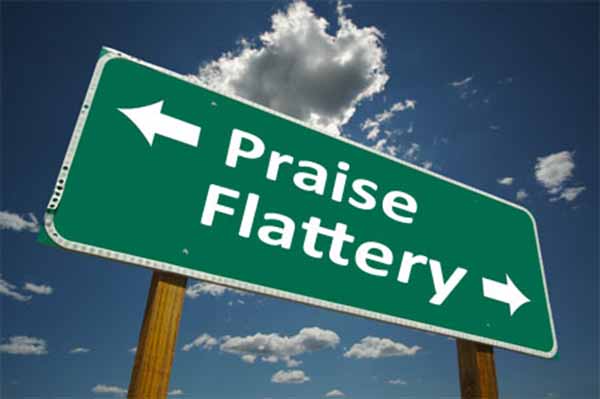

We all need a bit if flattery from time to time. People just seem to be suckers for flattery as it goes to issues of acceptance and self-esteem. Flattery is a positive frequency that makes you feel better yourself, especially in this Age of Healing issues and developing personal empowerment and self-confidence.
When you look good, you feel good. As is within, so is without.
Flattery is the act of giving excessive compliments, generally for the purpose of ingratiating oneself with the subject. Flattery often, but not always, connotes insincerity. Sometimes the motivation behind the flattering remark needs to be explored.
Flattery has its parameters as one should not say too much or too little just make the point and move on.
Some people can accept flattery easily as their self-esteem is intact and they known exactly who they are, while others, with low self-esteem, may have difficulty believing they are worthy of flattering compliments.
Issues all go to the same place, generally stemming from childhood, or psychological damage incurred from the people one has dealt with in their lifetime.
Depression and other emotional problems all reflect how one receives flattery.
In adult life, from time to time, we need flattery and praise from family members, relationship partners, employers, co-workers, and close friends.
If you have a good sense of self-esteem, you can accept flattery and return compliments with ease. If you have low self-esteem, you may wonder if there is an ulterior motive behind the flattery, the remark creating confusing in your thinking, where you wonder if the remark was used to win support for the other's side. Flattery, it is often believed, will get you anywhere.
Can you handle flattery? Are you worthy? Work at discovering your truth.
Historically, flattery has been used as a standard form of discourse when addressing a king or queen. In the Renaissance, it was a common practice among writers to flatter the reigning monarch, as Edmund Spenser flattered Queen Elizabeth I in The Faerie Queene and Shakespeare and William Shakespeare flattered King James I in Macbeth.
Flattery is also a standard form of pick-up used to attempt to initiate romantic courtship. Most associates with flattery, however, are negative. Flatterers are sometimes described by pejorative phrases, such as "suck-up," "ass-kisser" or "brown-noser." Negative descriptions of flattery range at least as far back in history as The Bible.